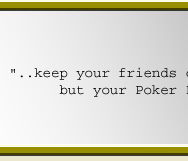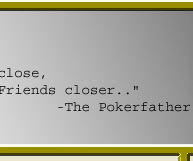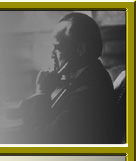(Click Here for the Latest Online Poker News Stories)
Copyright © The Record
HEADLINE: Conference Examines Educational Value
of Poker
Body:
This past Saturday, Harvard Law School hosted the first ever academic
conference on poker's strategic value. The conference, entitled
"Innovative Thinking: The Educational Value of Poker,"
brought together students, academics, businessmen, educators,
and experts from around the country.
The event was sponsored by the Global Poker Strategic Thinking
Society (GPSTS), recently founded by Professor Charles Nesson
and 3L Andrew Woods. Despite only being in its nascent stages,
the organization has already been garnering national attention.
After a brief introductory note from Professor Nesson, in which
he lamented the falloff in mathematics education once students
lose sight of practical applications, participants engaged in
an active discussion of the potential benefits of using poker
as a model for thought process.
The three experts made brief presentations that allowed the audience,
which included students, writers, business people and professors
in several disciplines, to interject and react. Poker
player, writer, and author of the bestseller "Positively
Fifth Street," Jim McManus was the first to present, and
shared an excerpt from his forthcoming book describing presidents,
generals, and other luminaries who were poker
players and used skills developed in the game to help them in
various important situations.
McManus focused particularly on applications of poker skills,
including risk assessment, high-pressure decision-making, and
opponent analysis by key players in the Cold War.
Mike Sexton, poker champion, World Poker Tour commentator, and
well-known face of the game, then discussed the rich history of
the poker and its
properly changing perception from a game played in smoky backrooms
of pool halls to a respected competitive event played and broadcast
worldwide.
Sexton also offered his personal poker story and described its
parallels to the overall trend. In addition, he added an optimistic
outlook for the future of poker, stating that he envisioned it
continuing to grow, especially with the skills it teaches being
increasingly recognized by the public.
Dr. Alan Schoonmaker, a psychologist with experience consulting
and writing in the fields of business and poker, outlined why
he saw the game as a teaching tool superior to sports, chess,
and other metaphors. Among the reasons listed, it has fair and
clear rules, provides quick feedback, teaches a person to manage
risk and information, requires self-discipline and helps players
learn to cope with losing, teaches how to handle good and bad
luck, and offers repeated opportunities to experiment.
After a break for lunch, Nesson and Woods held an interactive
workshop in which they taught newcomers how to play poker. In
order to focus on the strategic, skill-based betting aspect of
the game, each player was dealt one card face down and could then
make bets with chocolates. After several introductory hands, players
received an extra card, and the elements of Texas Hold 'Em (five
community cards with corresponding rounds of betting) were slowly
introduced.
Walking around the tables throughout the exercise, Woods stopped
players mid-hand and asked them to verbalize how they saw their
position in the hand evolving. Based on the actions of the players
before them, they were asked to guess how strong opponents' cards
seemed and even exactly what two cards others were holding. Players
were then instructed to use this information to analyze the relative
strength of their two cards and make intelligent betting decisions
accordingly.
Afterwards, participants were introduced to an educational game
called "Alpha-Bet," which combines the structure of
Texas Hold 'Em with the premise of Scrabble. Players are dealt
two cards face down, and there are community cards just as in
Hold 'Em, but the cards each contain a letter with a point value
assigned. The goal of the game is for the players to make the
best word (up to seven letters) with the available cards. By including
an element of literacy, the game adds yet another potential educational
aspect to a game of poker.
Nesson and Woods ended the workshop with a discussion of moving
forward with integrating poker
into educational curricula. While participants agreed that certain
steps must be taken carefully, including recognizing the dangers
of gaming addiction, the overall potential of poker as a strategic
and educational tool was recognized as overwhelming.
Noble
Poker Bonus
Related: See
US Poker
Article
downloaded from the World Wide Web on November 15, 2007
http://media.www.hlrecord.org/media/storage/paper609/news/2007/11/15
/News/Conference.Examines.Educational.Value.Of.Poker-3108046.shtml |
(Click Here for the Latest Online Poker News Stories)
|







